Why the new Sustainable Development agenda is “fundamentally compromised” by corporate interests
By Nafeez Ahmed
September 12, 205
This exclusive is published by INSURGE INTELLIGENCE, a new crowd funded investigative journalism project
By Nafeez Ahmed
September 12, 205
This exclusive is published by INSURGE INTELLIGENCE, a new crowd funded investigative journalism project
UN records reveal that the intergovernmental body has already marginalised the very groups it claims to be rescuing from poverty, hunger and climate disaster.
At the end of this month, the UN will launch its new 2030 Sustainable Development agenda for “people, planet and prosperity” in New York, where it will be formally adopted by over 150 world leaders.
The culmination of years of consultations between governments, communities and businesses all over the world, there is no doubt that the agenda’s 17 Sustainable Development Goals (SDGs) offer an unprecedented vision of the interdependence of global social, economic and environmental issues.
But records from the SDG process reveal that insiders at the heart of the UN’s intergovernment engagement negotiations have criticised the international body for pandering to the interests of big business and ignoring recommendations from grassroots stakeholders representing the world’s poor.
Formal statements issued earlier this year as part of the UN’s Post-2015 Intergovernmental Negotiations on the SDGs, and published by the UN Sustainable Development Division, show that UN ‘Major Groups’ representing indigenous people, civil society, workers, young people and women remain deeply concerned by the general direction of the SDG process — whereas corporate interests from the rich, industrialised world have viewed the process favourably.
Among the ‘Major Groups’ engaged in the UN’s SDG process is ‘Business and Industry.’ Members of this group include fossil fuel companies like Statoil USA and Tullow Oil, multinational auto parts manufacturer Bridgestone Corporation, global power management firm Eaton Corporation, agribusiness conglomerate Monsanto, insurance giant Thamesbank, financial services major Bank of America, and hundreds of others from Coca Cola to Walt Disney to Dow Chemical.
These interests have showered the UN’s SDG agenda with glowing praise — calling only for the need for further engagement with business and industry.
In its 24th July statement before one UN SDG review meeting, the Global Business Alliance — set-up by corporations to represent their mutual commitment to “market-based solutions” — proudly told delegates that the process “amplifies our traditional role in economic growth and innovation” and commended the SDG draft:
“An important role for business is recognized throughout.”
But the GBA also called for further changes to “fully capture the special role — and special obligations — that will fall to business as this Agenda plays-out.”
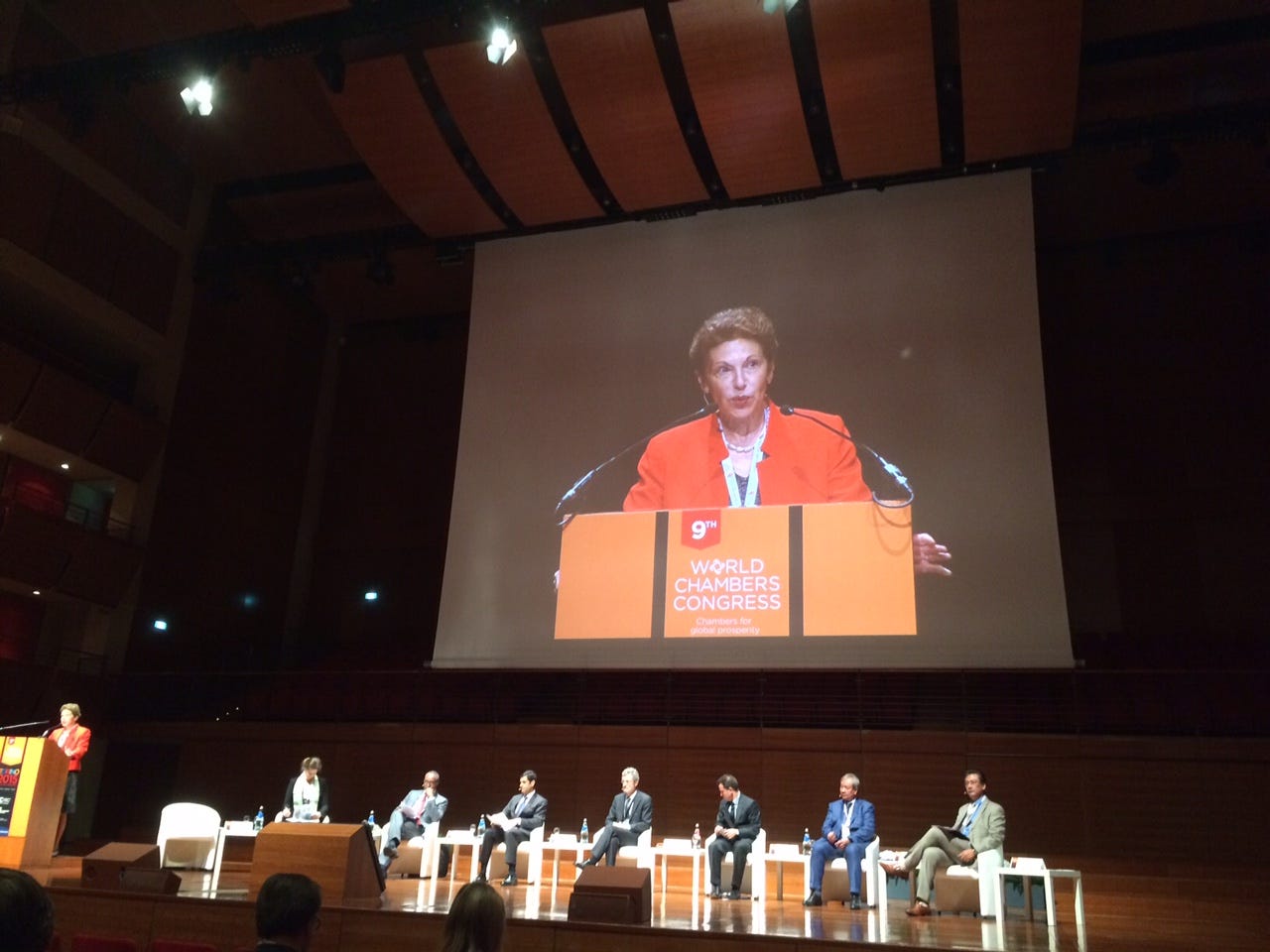
The GBA is a global business network set-up specifically to represent “global, regional, national and sectoral business organisations and associations” at the UN’s SDG process, “as well as companies from multinational corporations… from all geographic regions.”
It describes itself as “having a shared vision that market-based solutions are essential to move toward a more sustainable and equitable world.” At the UN, the alliance works “to ensure that private sector messages will resonate positively and coherently.”
The GBA represents global and regional business associations across key industries in the financial, mining, agricultural, fertiliser, pharmaceutical, oil and gas, and transport sectors.
The alliance’s mission can be discerned from a GBA statement in January made at the SDG Stakeholder Preparatory Forum at the UN Headquarters in New York.
While noting that business “enthusiastically welcomes” the sustainable development agenda, the GBA declared that its main priority is to create “policy environments” in poor countries “that are conducive to both domestic and international private finance.”
By re-structuring poorer economies to “mobilise and attract domestic and international investment”, the GBA claimed, they can build the “infrastructure necessary to spur inclusive economic growth.”
The problem is that this business-centric vision of “inclusive economic growth” is barely different from the failed neoliberal paradigm of market fundamentalism, which critics say has widened inequalities and accelerated debt.
Despite claims that the UN’s previous Millennium Development Goals (MDG) have succeeded in halving global poverty since the 1990s, there is good reason to question this n
Today, 4.3 billion people live on less than $5 a day. Although higher than the World Bank poverty measure at $1.25 a day, the development charity ActionAid showed in a 2013 report that a more realistic poverty measure would be under $10 a day.
Yet far from decreasing, since 1990 the number of people living under $10 a day has increased by 25%. Global poverty has not reduced — it’s got worse.
According to Dr. Jason Hickel of the London School of Economics, this is not surprising because the “claim that growth can eradicate poverty is not scientifically robust.” Hickel told me that this might “sound reasonable if you believe in trickle-down economics” — as do most conventional economists — “but the past forty years have delivered precious little evidence for this paradigm. The only way that the SDGs can claim that growth will eradicate poverty is by pushing the poverty line and the hunger line to incredibly low levels… lower than humans can actually survive on.”
I asked Hickel why, despite so much internal criticism from UN stakeholders within the SDG process itself, these concerns had not impacted on the text of the SDG ‘Zero Draft.’ “In an early version of the Zero Draft, there was a commitment to replace GDP with an alternative measure of economic well-being. But somehow that disappeared from the final text,” said Hickel. “I don’t know what happened behind the scenes.”
He refers to an account from someone working with the Brussels-based CIDSE (International Cooperation for Development and Solidarity), a network of 17 Catholic development agencies based in Europe and North America, “who had been involved with the negotiations on the Zero Draft…
“She told me that the process was highly compromised, and she quit in disgust — but she told me she was not allowed to share details about what she knew.”
This allegation is borne out by UN records, which show that its own Major Groups representing the very people the global institution professes to be empowering — poor people in developing countries — are increasingly sceptical of the SDG agenda.
A scathing joint civil society statement to the UN early last month expressed “alarm” at “the extraordinary level of confidence that governments are placing in the private sector to finance and implement the Post- 2015 Development Agenda.”
While the GBA’s UN submissions consistently blamed corrupt governments and legal frameworks in poor countries for lack of investment, the UN Major Group for Civil Society pointed out that the real obstacle is tax avoidance by foreign investors and corporate contempt for human rights:
“The notion that we need to unlock the potential of the private sector is fundamentally contradicted by the trillions of dollars currently leaving developing countries through corporate tax evasion and other illicit financial flows. Added to this is a general lack of accountability despite prolific evidence of systemic human rights abuses perpetrated by corporations that undermine development efforts.”
The civil society statement also points to parallel efforts by Western governments to forge new ‘free-trade’ agreements, such as the Transatlantic Trade and Investment Partnership (TTIP) along with proposed Investor-State Dispute Settlement (ISDS) clauses.
These new trade and investment frameworks are being negotiated by governments in secret without public accountability. The UN’s civil society group notes that the ISDS clauses “empower corporations to sue governments for reducing the value of investments through regulations that promote human rights, the environment, and labor standards.”
Yet the SDGs offer little to protect vulnerable communities in the face of such corporate encroachment.
Instead, as the UN’s civil society group observes, the SDG process is ignoring “growing evidence that privatisation of essential social services exacerbates inequalities in access and marginalises the poorest.”
A further civil society statement to the UN on the Means of Implementation of the SDG agenda in late July criticised the process for “failing to address” structural and institutional “barriers to people-centred development rooted in an unjust global economic system.”
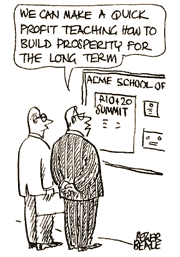
Such barriers, the NGOs declared, include a global “corporate rights regime” including the creation of “tools to sue governments when public policy threatens profits”; lack of “binding mechanisms to hold corporations accountable for human rights abuses”; “austerity and debt servicing measures, which starve public coffers and restrict public spending on social services and infrastructure”; and the “failure to allocate public resources to the public services and public goods required for healthy and sustainable communities.” In summary, the statement warned:
“The emphasis on private financing and the role of transnational corporations, will further weaken public policy space [for] governments and fails to address the unfinished business of regulating the financial sector despite the extreme and intergenerational poverty created by the global crisis.”
Other statements from UN stakeholders were equally damning.
On 25th March, the Indigenous Peoples Working Group told a Major Group dialogue hosted by the Trusteeship Council Chamber at UN headquarters that the SDG process “is in jeopardy of excluding Indigenous Peoples from the agenda.”
Both the SDG’s targets and the UN Statistical Commission’s critical review of the targets fail to recognise “the distinct cultural identities and political status of Indigenous Peoples who are rights-holders and agents of change.”
The Major Group for Workers and Trade Unions similarly delivered a statement to the UN as part of the Post-2015 Intergovernmental Negotiations highlighting serious limitations to the proposed indicators to measure progress on attaining SDG targets, especially in addressing education, the right to water, democratisation of work-places, wage disparities, trade unions, and excessive privatisation.
“The proposal focuses on outcome indicators at the expense of structure and process indicators. We want to see more indicators that assess the legal and institutional reforms which are key for sustainable and long-term change.”
The SDGs make no clear reference to the human right to water, for example, effectively providing “an open door for turning water into a commodity.”
The UN workers group particularly opposes the emphasis on public-private partnerships, which it describes as “an expensive and inefficient way of financing infrastructure and services, since they conceal public borrowing, while providing long-term state guarantees for profits to private companies.”
The group concludes to the contrary that: “Public investment in the provision of health, education, social services and water and energy utilities should be encouraged, instead of selling off public assets.”
According to the UN Major Group for Children and Youth, the SDG’s focus on cultivating more “growth, industrialisation and urbanisation” fails to account for “ecological footprints as compared to planetary boundaries.”
In their March statement at the UN, the group echoed the criticism from the UN Major Group for Workers regarding the omission of the right to water:
“… why was the term ‘human right to water and sanitation’ not included as an amendment for technical proofing, in spite of it being agreed in a General Assembly resolution 64/292? We notice inconsistencies in the type of reasoning for altering the targets. This is a dangerous precedent and any regression is not acceptable.”
The group also remarked that SDG targets on inequality and health were vague and insufficient. Without “caps on maximum and incomes and specific ratios between the top and bottom quintiles”, the inequality targets would not be impactful. The weakness of the health target was highlighted, especially in ignoring antimicrobial resistance.
A number of NGOs were deeply critical of the SDG’s commitment to gender equality. A July statement to the UN endorsed by the Asian Pacific Resource and Research Centre for Women (ARROW), World Young Women’s Christian Association, Partnership on Sustainable Low Carbon Transport and Youth Coalition for Sexual and Reproductive Rights expressed “deep disappointment” with the SDG’s Finance for Development initiative approved at the UN conference in Addis Ababa that month.
“Despite being heralded by many governments as a strong outcome for women and girls,” the statement said, “governments failed to commit to the reforms necessary to redress the profound inequities in our global and national economic policies that condemn women and girls to precarious forms of employment; increase their burden of unpaid care work; undermine their livelihoods as smallholder farmers and fisherfolks; and jeopardise their access to essential public services such as safe and reliable urban and rural transport services, which in turn hampers access to health and education.”
A damning report by the Women’s Major Group at the UN praised the SDG process for representing a “significant step,” but identified eight major “red flags” where the process had fallen short. Despite endorsing “gender equality,” the SDGs failed to recognise key human rights relevant to women and girls:
“… the human right to food, the right to water and sanitation as a goal, women’s rights to decision making on peace and security, the rights of indigenous peoples, and the right for women to control their sexuality free of coercion, discrimination and violence, amongst others are notably absent.”
The SDGs also limit government responsibilities regarding protection of reproductive rights “to those already elaborated in existing agreements. This is not good enough,” argued the UN group.
In fact, despite overwhelming support from UN member states for a more robust and transformative approach, the report reveals that “a vocal minority, including the Vatican and Saudi Arabia, has once again blocked consensus.”
The failure of the SDG process to incorporate such criticisms from the UN’s own Major Groups representing marginalised communities, is a direct result of entrenched power disparities within the UN itself.
According to an expert report circulated to UN officials, a detailed analysis of SDG documents reveals that the entire process has been “fundamentally compromised” by corporations with a vested interest in continuing business-as-usual.
Commissioned by Washington DC-based nonprofit TheRules.org — a global collective campaigning to address the root causes of poverty — the report is based on a ‘frame analysis’: a social science method of analysing linguistic and conceptual patterns to reveal how people define, construct, and process information.
Authored by systems theorist Joe Brewer, Director of Research at TheRules.org, the report concludes that the UN’s vision is “doomed to failure” because it simply ignores the structural causes of global poverty.
“The single biggest problem is the structural absence of any discussion about political agendas,” said Brewer.
“As the politics of development are completely removed from discussion in the SDG process, this agenda gets adopted by default without any deliberation or debate. Add to this the myopic focus on growth as the only solution and we get the antithesis of sustainability or inclusive economics as a result.”
In addition to mis-framing the structural origins of poverty, the report shows that the very concept of “development” deployed within the UN’s SDG documents derives from a “specifically neoliberal and corporatist conception of how the world does and should work.”
Despite acknowledging “deep problems and contradictions when relying on GDP growth to tackle poverty”, the SDG agenda still leaves “undifferentiated, perpetual growth” as the prime basis of development.
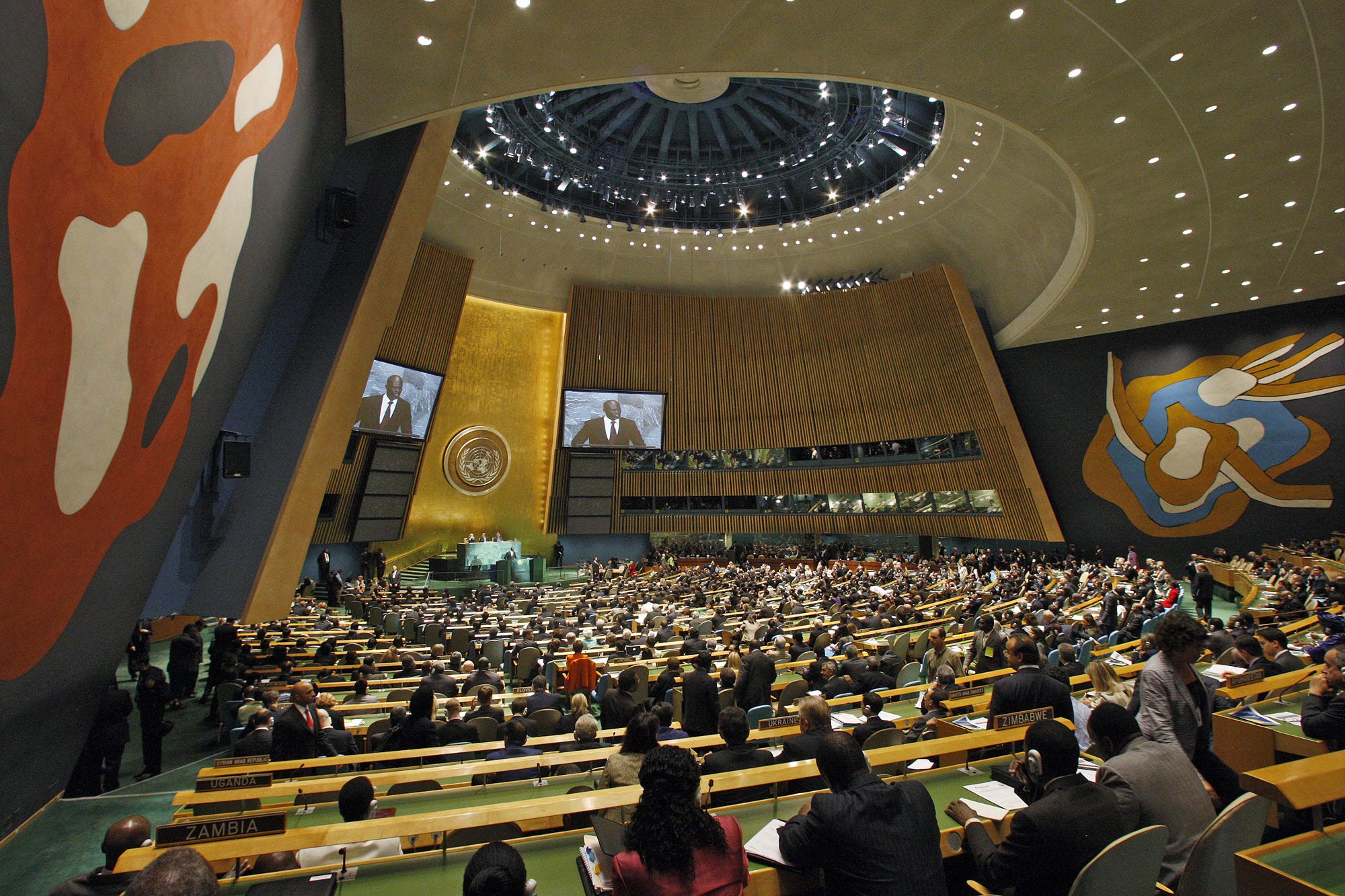
The UN also demonstrates “a confused and contradictory understanding of whether the economy is something linked with or separate from the economy; there to dominate or work within. No credible use of the word sustainable would perform this way.”
I asked Alnoor Ladha, co-founder of TheRules.org, how the UN had responded to their critique.
“We have sent versions of this argument to various people at the UN and the Millennium Campaign over the years and recent months, and they don’t really engage,” he said.
Yet a vast wealth of cutting-edge scientific research has cast doubt on the viability of continuing economic growth as a solution to global challenges, including poverty.
According to the Worldwatch Institute’s new State of the World 2015 report released in April, more economic growth is not the answer. Economic objectives must shift away from growth toward new measures of human well-being as their primary indicators — which the SDG process has not done.
This year’s State of the World report, which is produced annually by the Worldwatch Institute to assess the scale of global environmental, energy and economic crises, concludes that far from being a no-brainer solution, economic growth is the core driver behind “most environmental problems, and it has produced a world in which human activities have grown too large for the planet to accommodate them sustainably… Yet few recognize that growth itself needs to be abandoned as a national goal.”
While most governments and businesses still regard unlimited economic growth as indispensable, in reality growth is “barely 50 years old” as a matter of national policy:
“An economy that is not driven by growth of material through-put — yet that still offers adequate employment and reduces inequality and environmental impact — is achievable.”
But exactly how unsustainable is the UN’s concept of growth-driven ‘sustainable development’?
A new study in the leading peer-reviewed journal, Sustainability Science, by an interdisciplinary team of Spanish scientists, shows unequivocally that the era of economic growth is coming inevitably to a near-term close, largely due to the “end of the era of cheap and abundant energy flows.”
This forecast is based on the World Limits Model (WoLim) created by the Energy and System Dynamics Group of the University of Valladolid, which models renewable and non-renewable energy sources, demand generated by the socio-economic system, and climate dynamics.
The study, led by Dr. Inigo Capella-Perez of the University of the Basque Country’s Institute for Public Economics, is part of a wider low carbon research project funded by the Spanish Ministry of Science and Innovation.
In its conclusions, the paper rejects the common assumption within the conventional sustainable development paradigm that “technological innovation will be the main driver to overcome all limits (resources & sinks) and problems if the markets work appropriately and the right investments are made.”
To the contrary, the model results show that “if the growth paradigm is maintained,” renewable energies, efficiency improvements and other ‘sustainable’ development policies will be unable to avert a “systemic energy shortage in the next decades… The results suggest that growth and globalisation scenarios are not only undesirable from the environmental point of view, but also not feasible.”
The ultimate conclusion of the Spanish team is that “prosperity for all the world cannot be based on the current GDP growth paradigm.”
The SDG process is not all bad. More than ever before, it puts people and the environment at the centre of the global policy debate, mainstreaming ecological concepts previously seen as anathema by the business community.
A GBA position paper on resources and materials management, for instance, drafted for the Post-2015 SDG process and authored by the International Council on Mining and Metals, acknowledges that “the consumption of materials and natural resources is increasing, in many cases exponentially.” This is “increasing stress” on the supply of resources critical “to sustain societies, the economy and the environment.”
The paper accordingly advocates a range of environmental techniques including sustainable consumption and production, sustainable value chains, the circular economy, sustainable materials management, life-cycle thinking, and reducing demand for natural resources so as not to “overdraw Earth’s natural capital.”
All this is greatly welcome, but remains couched in the assumption that sustainable development must aim to “extend the ‘carrying capacity’ of the earth sustainably into the future.”
In other words, technological fixes are required to ‘sustain’ endless growth, repackaged by the GBA as “Green Growth”, supposedly achieved through “the decoupling of development from the depletion of natural resources and capital.”
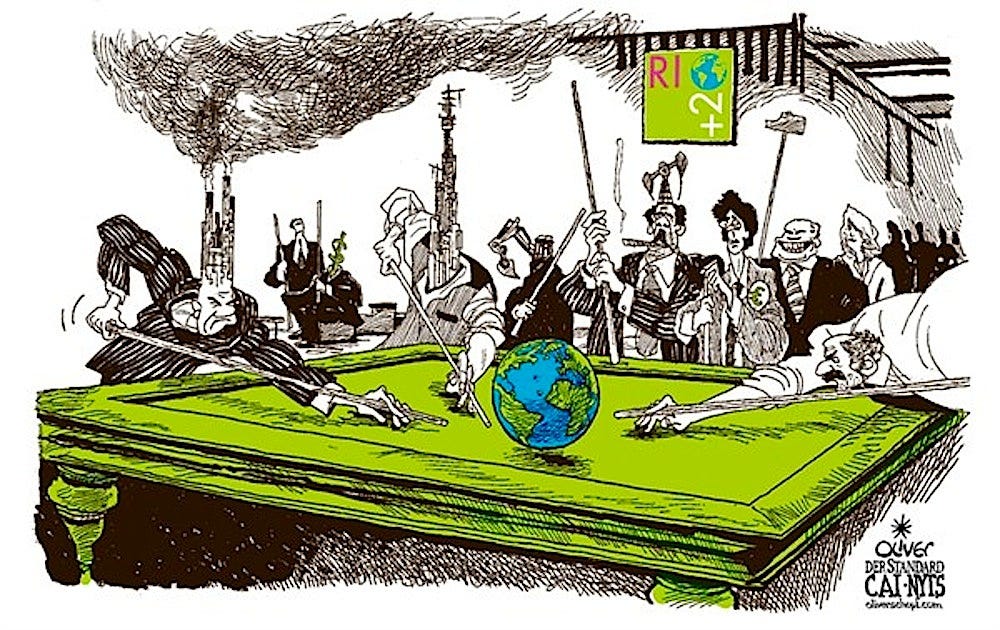
Here, “decoupling” invokes the idea that clean technological innovation can allow material growth to continue indefinitely, without consuming natural resources.
Yet this notion of decoupling, so central to the UN’s paradigm of ‘sustainable development’, is scientifically incoherent.
According to James H. Brown, a distinguished professor of biology at the University of New Mexico who won the MacArthur Award from the Ecological Society of America for his metabolic theory of ecology, the UN’s sustainable development goals amount to a huge “oxymoron.”
Writing in the Oxford University Press journal BioScience a week ago, Prof. Brown took particular issue with the explanation of the UN sustainable development goals in a new book by Prof. Jeffrey Sachs of Columbia University, The Age of Sustainable Development.
Sachs’ book provides a lucid insight into how the sustainable development paradigm has been co-opted by neoliberal economics, at the expense of science.
Sachs was special advisor to UN Secretary-General Ban Ki-Moon on the MDGs, and is Director of the UN’s Sustainable Development Solutions Network. Ban even wrote a foreword to Sachs’ book. But its argument, according to Prof. James Brown, is deeply flawed.
“Continual population growth and economic development on a finite Earth are biophysically impossible,” wrote Brown, lamenting Sach’s failure to “do a rigorous scientific evaluation.” The SDGs, he argued:
“… violate the laws of physics, especially thermodynamics, and the fundamental principles of biology… Population growth requires the increased consumption of food, water, and other essentials for human life. Economic development requires the increased use of energy and material resources to provide goods, services, and information technology.
Existing uses of these resources have already created an unsustainable bubble of population and economy. Unless current trends can be reversed, a catastrophic crash is inevitable… Humans are rapidly depleting the finite reserves of fossil fuels that power the current industrial–technological economy. Resource shortages are evidenced in declines since the 1980s in per-capita consumption of oil, natural gas, metal ores, phosphate (an essential fertiliser), fresh water, arable land, and ocean fisheries.”
Apart from the fact that the SDGs are conveniently designed to “profit individuals and corporations in developed countries that sell goods, services, and information to the developing world,” Prof. Brown further dissects the “biophysically impossible” ramifications of trying to eradicate poverty in the developing world by applying the industrial model of unlimited growth:
“… energy consumption would need to increase more than threefold in China and more than tenfold in the poorest developing countries to attain a US level of economic development and standard of living. This is clearly impossible in the foreseeable future.”
Brown knows what he’s talking about. He is co-author of a startling paper published last month in the Proceedings of the National Academy of Sciences which warns of human civilisation becoming completely unsustainable due to its exponentially increasing depletion of biomass energy.
“You can think of the Earth like a battery that has been charged very slowly over billions of years,” said Brown’s fellow author Prof. John Schramski of the University of Georgia. “The sun’s energy is stored in plants and fossil fuels, but humans are draining energy much faster than it can be replenished.”
Over millions of years, the Earth has slowly accumulated approximately 1,000 billion tonnes of carbon in living biomass. Yet in just the last 2,000 years of human civilisation — a tiny blip by comparison — humans have consumed a whopping half of that biomass already, 10% of which has been destroyed in the last century alone.
“If we don’t reverse this trend, we’ll eventually reach a point where the biomass battery discharges to a level at which Earth can no longer sustain us,” Schramski said.
Hidden between the lines of the SDG vision, then, is a great delusion — the unflinching blind faith of the rich industrialised elite in the unquestionable perfection and immortality of neoliberal capitalism as a ‘way of life.’
What can explain the persistence of this blind faith in the face of scientific reality?
According to Brewer, by removing all discussions about power from the SDG process, “the increasingly unpopular neoliberal agenda remains fully in place.”
The total omission of corporate and banking power from SDG texts, despite their unprecedented prevalence in the UN process, “is very telling in its own right,” he told me. “We know that multinational corporations are the most powerful political actors, and that they are profoundly concentrated vehicles for wealth consolidation.”
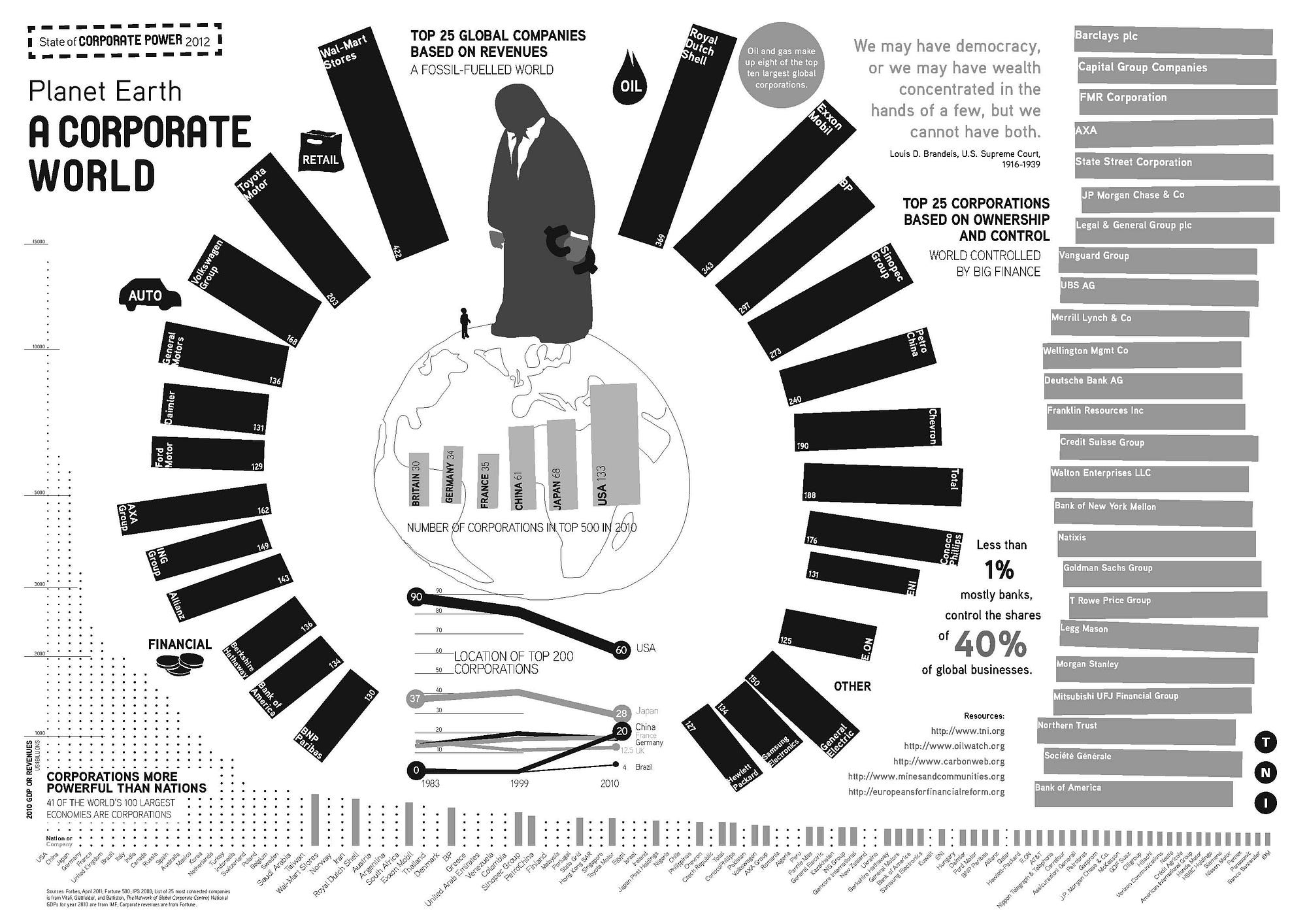
To some extent, this is intentional. Despite these concerns being raised within the UN SDG process itself, “they don’t appear in the official documents,” said Brewer.
This is why, Alnoor Ladha explained, TheRules.org did not engage in the formal UN civil society SDG process.
“The process is a sham,” he said. “They will co-opt our engagement and say they have consulted us. All of the civil society groups that have tried to reform the SDGs have been co-opted by the UN, including the more critical voices.”
In other words, the SDG stakeholder engagement process draws selectively on the input of civil society groups to promote its public legitimacy, while systematically ignoring the voices that challenge the wider political and economic structures in which the entire process is embedded.
“The big corporate powers via Global Compact and the rich nations have already agreed on what the fig leaf will look like,” said Ladha. “Whatever the SDGs end up saying will, by the very logic of the system they serve, promote a growth-at-all-costs, neoliberal game plan of trickle-down economics and climate destruction.”
But Ladha’s colleague, Joe Brewer, emphasised that this apparent sleight-of-hand is ultimately about the power of ideology. Neoliberal capitalism prevails as the default position not just because of a conspiracy of the powerful, but because it is already everywhere. Everyone, even the less powerful, find it difficult to imagine a world outside capitalism — and so the assumption is that such a world is simply not an option:
“The logic of neoliberal capitalism is now the water people swim in culturally. It is largely invisible and most don’t realise how their minds default to the dominant commonsense frames of economics discourse.”
Yet the science is increasingly incontrovertible: capitalism’s endless growth paradigm is unsustainable. The post-capitalist era is dawning. And the frog — in this case, the human — is boiling in a dying paradigm of its own construction that has far outlived its usefulness.
Rather than languishing in neoliberal denial — sanitised with comforting sustainability rhetoric — this entails the urgency of embracing the inevitability of the post-carbon, post-capitalist era.
This doesn’t mean we must capitulate to fatalism. The end of capitalism will not automatically usher in the end of prosperity, although it will require a radical rejection of the values of mass market consumerism.
As Dr. Inigo Capella-Perez and his colleagues conclude in their Sustainability Science study forecasting the end of growth, a meaningful sustainable development trajectory would involve the most energy intensive consuming countries reducing their average energy use rate “by at least 4 times”, decreasing their GDP roughly to the current world average.
Rather than involving a regression to an impoverished medieval existence, the combination of high technology, circular economy principles, along with a transition to clean and localised forms of food, water and energy production could more than meet fundamental material needs while permitting a considerable increase in well-being.
Such “reductions through lifestyle and cultural changes oriented towards ‘sufficiency’ might actually be welfare enhancing,” the Spanish scientists conclude. This simplification of industrialised economies “would allow people living in Southern [poorer] countries to increase their per capita energy use by 30%”, translating into “a threefold increase of GDP in the same period.”
Sustainable development, they argue, does not mean relentlessly exporting the broken model of endless industrial material through-put into the developing world. In contrast, it requires a global “convergence” premised on equality of access for all.
Their WoLim system dynamics model shows that this pathway is not a utopian pipe-dream, but an achievable possibility that could avoid some of the worst-case scenarios for climate change.
But to get there, we must use the opportunity provided by the SDG’s mainstreaming of ecological awareness as a cultural springboard to catalyze a public counter-narrative to the prevailing paradigm.
For Brewer, this must involve a “fully systemic” approach to recognising the interdependence of global challenges, employing the tools of “ecological economics and complexity science from the beginning.”
Rather than pretending they don’t exist, he said, agendas of the powerful need to be the “central focus” of this counter-narrative: “There needs to be a truth and reconciliation process before it becomes possible to advance a truly sustainable and equitable development trajectory for our fledgling planetary civilisation.”
Dr Nafeez Ahmed is an investigative journalist, bestselling author and international security scholar. A former Guardian writer, he writes the ‘System Shift’ column for VICE’s Motherboard, and is a weekly columnist for Middle East Eye.
He is the winner of a 2015 Project Censored Award, known as the ‘Alternative Pulitzer Prize’, for Outstanding Investigative Journalism for his Guardian work, and was selected in the Evening Standard’s ‘Power 1,000’ most globally influential Londoners.
Nafeez has also written for The Independent, Sydney Morning Herald, The Age, The Scotsman, Foreign Policy, The Atlantic, Quartz, Prospect, New Statesman, Le Monde diplomatique, New Internationalist, Counterpunch, Truthout, among others. He is a Visiting Research Fellow at the Faculty of Science and Technology at Anglia Ruskin University.
Nafeez is the author of A User’s Guide to the Crisis of Civilization: And How to Save It (2010), and the scifi thriller novel ZERO POINT, among other books. His work on the root causes and covert operations linked to international terrorism officially contributed to the 9/11 Commission and the 7/7 Coroner’s Inquest.
This exclusive is being released for free in the public interest, and was enabled by crowdfunding. I’d like to thank my amazing community of patrons for their support, which gave me the opportunity to work on this story. Please support independent, investigative journalism for the global commons via Patreon.com, where you can donate as much or as little as you like.